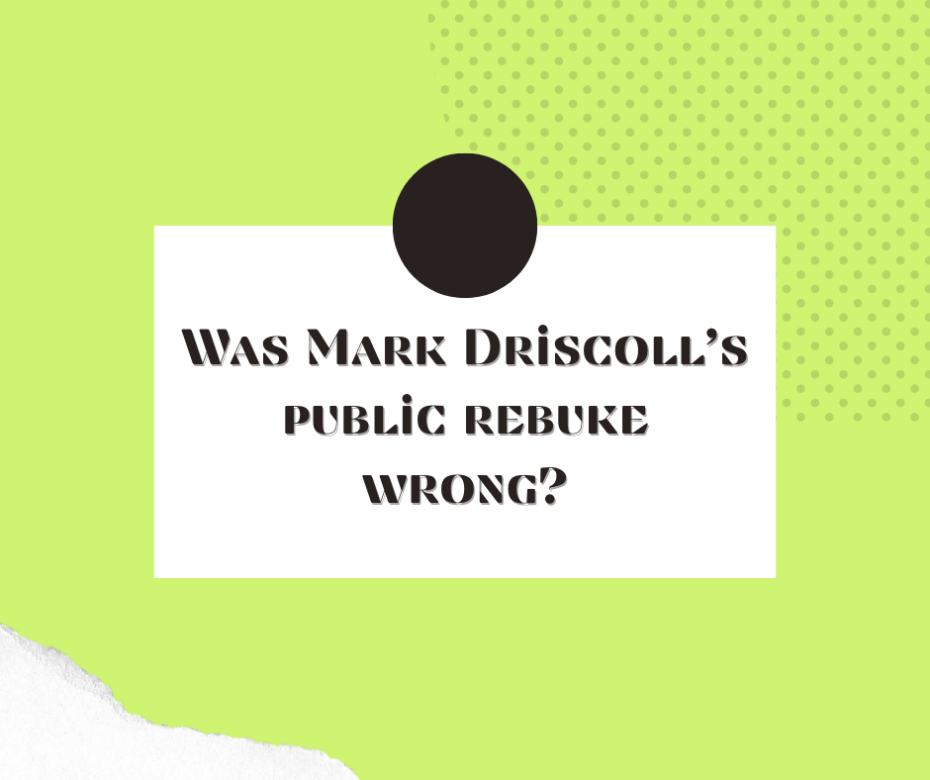At a recent men’s conference in Springfield, Missouri, Mark Driscoll, the well-known former pastor of Mars Hill, was booted off stage during his guest speaking appearance. The “Stronger Men’s Conference” was hosted by the James River Church, which is pastored by John Lindell. The conference’s stated purpose was to equip men to “live out God’s vision for manhood.” To open the event, a leather-trousered performer tore off his shirt, swallowed a sword, and proceeded to climb a pole positioned on the stage.
When Driscoll took the stage, he commented on the performer and called out the inappropriate behavior. As Driscoll was making his comments, Pastor Lindell interrupted, telling Driscoll, “You’re done.” After Driscoll left the stage, Lindell cited Matt 18:15 which states:
Moreover, if your brother sins against you, go and tell him his fault between you and him alone. If he hears you, you have gained your brother (emphasis added).
He argued that Driscoll was out of line for rebuking the situation publicly, and that he should have gone to the leadership privately. There is much that could be said about Mark Driscoll, John Lindell, and this men’s conference. Driscoll is no stranger to controversy, having left his former church under a cloud of allegations. In addition, the performer was objectively an inappropriate choice for a Bible conference, and the planning leadership should have known better.
However, there is a broader discussion worth having regarding the application of Matt 18:15 to this situation. Many echo the words of Lindell, saying that when an issue comes up in the church it should always be taken care of privately. Believers who publicly rebuke other believers or even acknowledge a disagreement in a public setting are often called out for unloving behavior. Some will even claim it was an attack, or a form of gossip. But is this true? Is it always wrong to publicly renounce sin and to rebuke those in the church who support it?
In Gal 2:11-16, the Apostle Paul discusses a time when he had to rebuke the Apostle Peter. Peter had been excluding Gentiles by separating himself from them when eating. To make matters worse, he had caused others to follow his example, including Barnabas, who was carried away by the hypocrisy (vv 11-13). Peter’s actions were on public display and were causing others to sin.
It should also be noted that Peter was being disingenuous by eating with the Gentiles at times, then separating himself at other times. That even the godliest of leaders can fall into such two-faced and manipulative behavior should not come as a surprise. In v 14, Paul specifically notes that in Peter’s actions there was a failure to be straightforward about the truth. Therefore, Paul rebuked the apostle “before them all” (v 14). Due to Peter’s behavior and public misconduct, Paul’s public display of disapproval (and rebuke) was necessary.
There are two distinctions that should be noted between these two passages. First, in Matthew 18, the sin in question was done directly against a brother. The church is not publicly aware, directly impacted, or participating in the sinful activity that was committed. In that situation, the sin was directed toward a specific individual. Therefore, that individual should go to the sinning brother in private.
In Paul’s example, there wasn’t a direct sin toward him, specifically. Peter didn’t sin against Paul the individual. In short, Matt 18:15 doesn’t apply, and is therefore not a method that covers all situations involving church discipline or disputes.
The second distinction that should be noted between these passages is that Peter’s misbehavior was done in a public setting. In addition, it was causing others to fall into sin. It undermined the teachings of the apostles. When there is a public offense that impacts sound doctrine and the believing community, not only is a public rebuke justified–it is necessary (1 Cor 5:1-6). If Paul had gone to Peter privately and the issue was never renounced publicly, the church community would have had no definitive resolution to the issue, and the behavior and false teaching could have continued to spread throughout the church.
When it comes to sound doctrine and the well-being of the church community at large, a private meeting is not applicable. Any claims to a private meeting are made void when the offense has a corporate impact. Such claims often deflect the real issue. Sadly, many of our leaders have used the misapplication of Matt 18:15 to gaslight believers into not rebuking sin and false teachings.
Of course, public rebuke (and private rebuke as well) should be done with humility and the knowledge that we, like Peter, are all capable of falling into sin.

